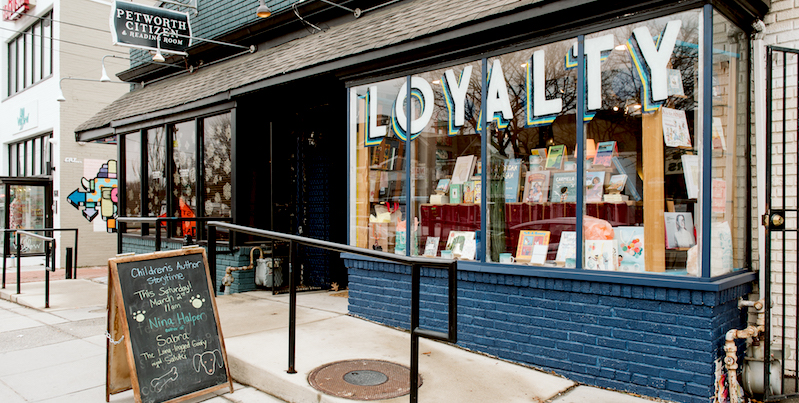September 22, 2025, 2:05pm
Loyalty Bookstore, in the northwest D.C. neighborhood of Petworth, has experienced a downturn in sales since federal jackboots hit the capitol pavement, as NBC’s News4 recently reported. The bookstore, which according to their website “aim[s] to bring the best diverse books and events to our community” and “center Black, PoC, and Queer voices,” experienced a 60% drop in sales this August.
The News4 piece describes a variety of factors that contributed to the loss: an expected summer slump, DOGE firing a lot of workers who now have to be more choosy with their spending, and troops scaring people off.
Publishers Weekly found similar sales dips in other D.C. bookstores: Little District Books, East City Bookshop, Lost City Bookshop, and Kramers all told PW that sales were down.
Overall, D.C.’s bookstore workers are noticing a shift in energy. “The vibe is bad,” Loyalty’s co-owner Hannah Oliver Depp told News4. “People are in pain, they’re suffering, they’re scared, they’re upset.” And Shady Rose, general manager at Loyalty, told Publishers Weekly that “the neighborhood has been starkly empty, even on weekends.”
D.C.’s Lost City Bookshop seems to be doing all right on sales, but also noticed the same chill in the air; owner Adam Waterreus noted that “the energy on the street, the amount of people out and about—all feel different.”
Not everyone is hurting: shops that have branches in the suburbs seem to be doing slightly better, likely since people are avoiding a militarized DC. Seeking refuge in bookstores might be helping in some cases too. Solid State Books in D.C. has seen a slight boost in sales, which one of its owners attributes to their shops as “a refuge of sorts from the chaos of the outside world.”
This is not just hitting the bookstore economy, of course. D.C. is suffering across the board, with economic activity down overall. We felt the same slump earlier this year in other federally targeted cities—L.A.’s small businesses described the impact of summer ICE raids as “worse than COVID.” The American Immigration Council reported this summer about how economically disastrous this administration’s policies are for the American economy. There is no level, economic, humanitarian, or otherwise, on which these policies make sense.
This isn’t to equate a bookstore’s sales to the plight of people targeted by the state. The immigrants, trans people, and protesters who are being scapegoated and abused by Trump and his hogmen are more important than a sales figure. The personal, human impact is gruesome, and always worth re-centering when things get abstracted into statistics and profits. After all, the measurable abstraction of the economy is made up of our bodies and our labor—the numbers are going to bleed accordingly.
But the remedy—activism, community, and care—always has a physical dimension, and bookstores are more than just places to buy books. The San Gabriel Valley Tribune’s Victoria Ivie wrote this summer about how local bookstores are providing mutual aid and information to their communities; Loyalty Bookstores, the D.C. shop profiled by News4, is actively engaged in fundraising, outreach, and resource sharing; and a bookstore in Maine partnered with two local groups for a book drive for trans care, to name just a few.
You’re a Lit Hub reader, so I don’t need to tell you how important bookstores are. Worrying about sales can seem like small potatoes in the face of everything going on, but any space where people can gather, connect, and build community power is worth protecting.
If you’re looking to support, buy a book!
